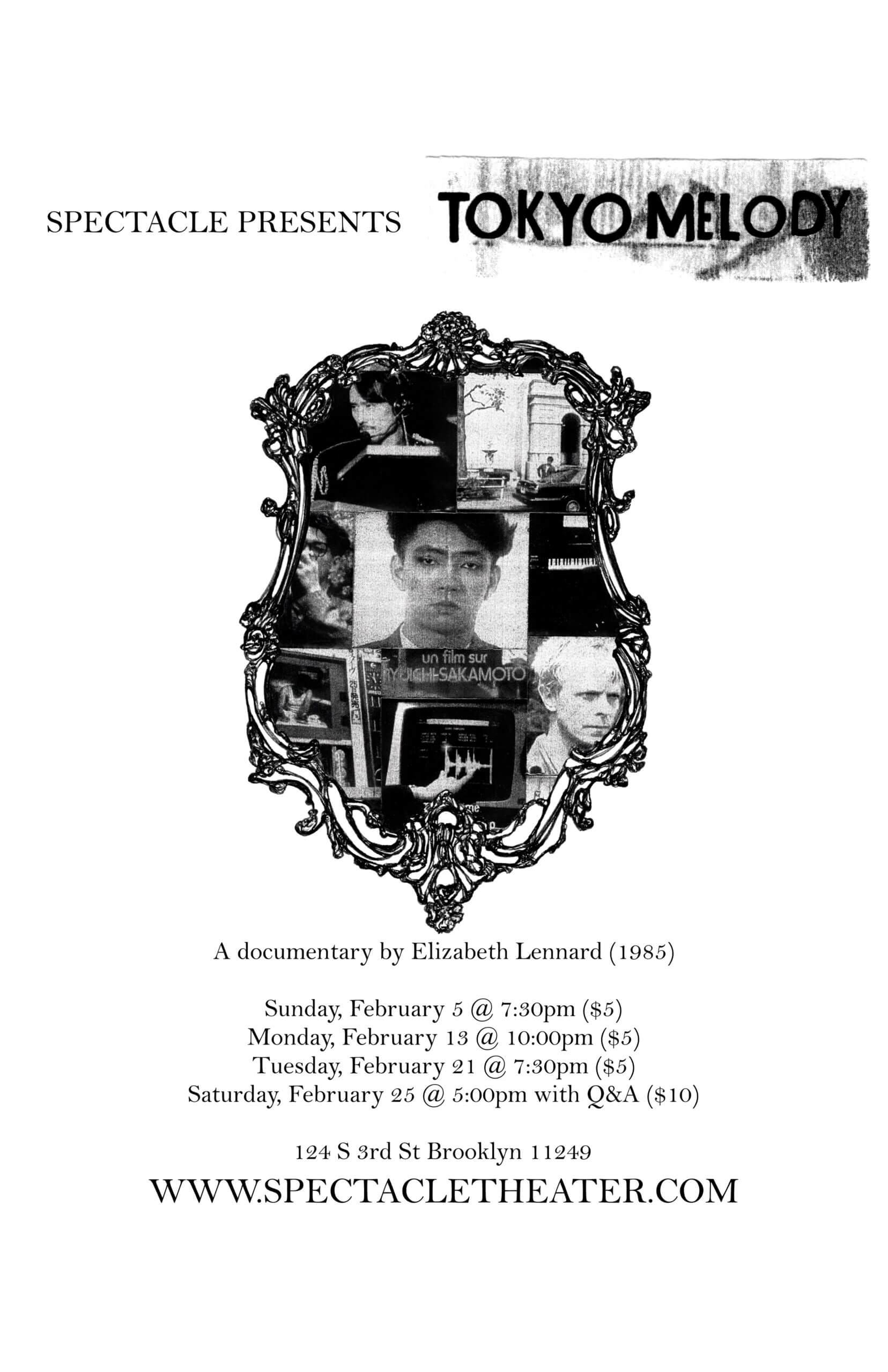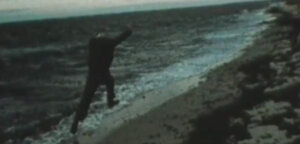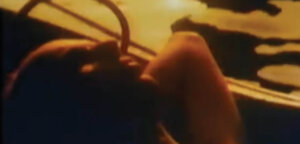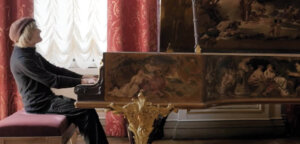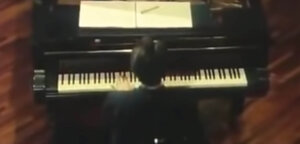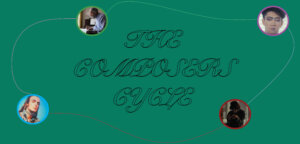
Punks. Rockstars. Singer-songwriters. All of these have gotten their due at ROCKUARY. But what about the composer, that sometimes gentle, sometimes overcharged musical force armed with maniacal meticulousness and creative wizardry?
This ROCKUARY, Spectacle presents THE COMPOSERS CYCLE, a series devoted to brilliant musical tinkerers. Dorian Supin’s ARVO PÄRT — AND THEN CAME THE MORNING AND THE EVENING (1990) shows the eponymous composer hard at work, doubly troubled by the political struggles in his native Estonia and perceived inability to honor the Divine with his compositions. Filmmakers Alfi Sinniger, Duncan Ward, and Gabriella Cardazzo, all refract the famed Brian Eno’s personality through their own cinematic language, producing unique portraits that tenderly reveal his mystic manner of music-making. ENO (1973) and BRIAN ENO: IMAGINARY LANDSCAPES (1989) both show the self-proclaimed “synthesist” at different points in his musical career, testifying to his energized verve to experiment. Andrés Duque, conversely, films composer Oleg Nikolaevich Karavaichuk reminiscing on his legacy as he is about to turn 90 in OLEG AND THE RARE ARTS (2016). And Elizabeth Lennard’s TOKYO MELODY: A FILM ABOUT RYUICHI SAKAMOTO (1985) offers a look at the renown composer piecing together his first solo album, commenting on his years with Yellow Magic Orchestra, and pondering over where his career will take him next. With all its variants, THE COMPOSERS CYCLE attests to histories of continued experimentation with music, showcasing personalities on the brink of artistic breakthroughs, or reflecting on their brilliant careers.
ARVO PÄRT: AND THEN CAME THE MORNING AND THE EVENING
dir. Dorian Supin, 1990
61 mins, Estonia, Finland
In German, Russian and Estonian with English subtitles.
SUNDAY, FEBRUARY 5 – 5:00 PM
FRIDAY, FEBRUARY 10 – 10:00 PM
WEDNESDAY, FEBRUARY 15 – 10:00 PM
FRIDAY, FEBRUARY 24 – 10:00 PM
In this curious portrait of the famed Estonian composer, documentarian Dorian Supin spins Arvo Pärt’s melancholy musings into a treatise bearing transcendental weight that shares more in common with the films of Andrei Tarkovsky than your average music documentary. As Pärt waxes poetic on everything from churches to peeling potatoes, intercut scenes of nature reveal the sublime power of his art: one that seduces the listener toward divine trance.
Shot during the turbulent Estonian Revolution, Supin also uses his documentary as a way for Pärt to impart his humanist philosophy before the camera. He does so begrudgingly, as though defeated. And when he can’t find the words to comment on the ills of the world, as well as his own sense of political ineffectuality, he lays his head on his piano and plays. From here spring the film’s most touching moments, with his compositions performing as both a palliative from politics and evidence to the conditions that inspire it.
BRIAN ENO: IMAGINARY LANDSCAPES
dirs. Duncan Ward & Gabriella Cardazzo, 1989
41 mins, United Kingdom
In English
WEDNESDAY, FEBRUARY 15 – 7:30 PM
SUNDAY, FEBRUARY 19 – 5:00 PM w/ Q&A (This event is $10)
SATURDAY, FEBRUARY 25 – 10:00 PM
TUESDAY, FEBRUARY 28 – 7:30 PM
In Duncan Ward and Gabriella Cardazzo’s BRIAN ENO: IMAGINARY LANDSCAPES, the composer appears more reserved than he was in his younger years. Past his rock-phase, Eno is still seen experimenting with synthesizers and reflecting on his ritualistic manner of composing. As Eno muses on music, directors Ward and Cardazzo play with dreamy montages of cityscapes and desert landscapes that complement his words. Between the synthesist’s words and the directors’ images, a riveting collage coalesces to the tunes of the master composer.
screening with

ENO
dir. Alfi Sinniger, 1973
24 mins, United Kingdom
In English
ENO is Brian Eno at his most scintillating: a rock-star in Roxy get-up aspiring to shake up the genre’s foundations. Alfi Sinniger presents his eponymous subject candidly. Eno is shown meticulously toying with synthesizers, scribbling in his many notebooks, and furiously looking to come up with the next musical concoction that he believes will change the world. Alfi Sinniger’s ENO is a far cry from more recent documentaries on the famed composer, capturing him at the precipice of a fabulous career to come, high-strung on all the ideas that would soon spill from his mind.
OLEG AND THE RARE ARTS
(Oleg y las raras artes)
dir. Andrés Duque, 2016
70 mins, Spain
In Russian with English subtitles
TUESDAY, FEBRUARY 7 – 7:30 PM
SUNDAY, FEBRUARY 12 – 5:00 PM w/ Q&A (This event is $10)
SUNDAY, FEBRUARY 19 – 7:30 PM
SATURDAY, FEBRUARY 25 – 7:30 PM
Having outlived his peers and disgruntled by the recent history of musicianship in Russia, Oleg Nikolaevich Karavaichuk bears his soul on screen. In a series of interviews with director Andrés Duque, Karavaichuk denounces Russian society’s diminishing respect for cultural affairs and the lack of innovation in his field.
Walking around his sylvan neighborhood on the outskirts of St. Petersburg, Karavaichuk also remarks on what being an artist was under Stalinism and recalls living among like-minded artists such as Andrei Tarkovsky. Duque’s small portrait of one of Russia’s most idiosyncratic musicians produces a larger commentary on the de-evolution of art in contemporary society, and the role power-hungry politicians play in sidelining experiments in expression.
TOKYO MELODY: A FILM ABOUT RYUICHI SAKAMOTO
dir. Elizabeth Lennard, 1985
62 mins, France and Japan
In Japanese, English and French with English subtitles
SUNDAY, FEBRUARY 5 – 7:30 PM
MONDAY, FEBRUARY 13 – 10:00 PM
TUESDAY, FEBRUARY 21 – 7:30 PM
SATURDAY, FEBRUARY 25 – 5:00 PM w/ Q&A (This event is $10)
In TOKYO MELODY: A FILM ABOUT RYUICHI SAKAMOTO, the eponymous composer is seen at the height of his popularity, performing alongside Yellow Magic Orchestra across Japan, and investing his remaining time toward developing his solo compositions. Filmmaker Elizabeth Lennard captures Sakamoto at his most stylish and sedulous; Sakamoto is seen discussing his aesthetic interests, understanding of time, and the influence new technologies will have on the future music production.
During one of the film’s most touching sequences, the composer is filmed performing a piano duet with his wife Akiko Yano, aka “Japan’s Kate Bush.” In the afterglow of an early popular music career and moving toward establishing himself as a globally renowned composer, Sakamoto glints with genius throughout Lennard’s taut documentary. As a time-capsule of 1980s Japan, and Sakamoto’s role in its music scene, TOKYO MELODY offers a brilliant mix of insightful reveries, arresting sights, and fabulously rendered scenes from everyday life.
